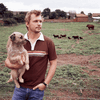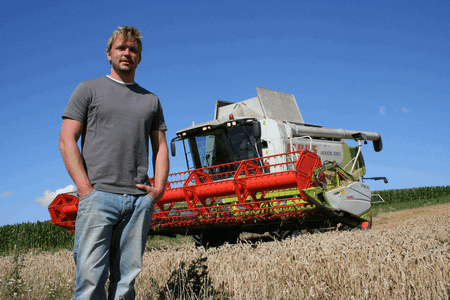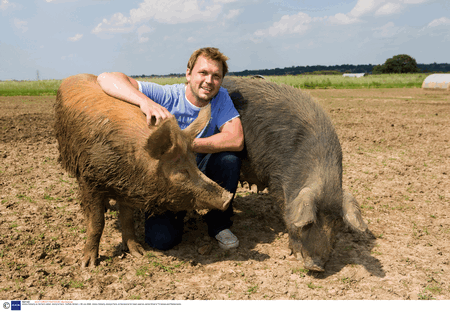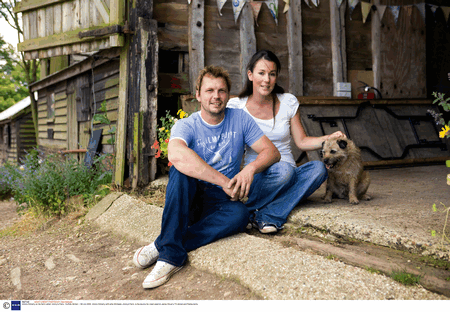Farming’s unlikely hero, FW interviews Jimmy Doherty

Not so long ago, the notion of getting a show on primetime TV with the words “farming” and “heroes” in the title would have been unimaginable.
But that’s exactly what has happened, with the second of six such programmes having aired on BBC2 on Tuesday. The answer, perhaps, to why it’s made it onto our screen lies in the other two words in the title.
The series is Jimmy Doherty’s Farming Heroes, and the man in front of the camera first hit the headlines through the 2002 fly-on-the-wall documentary about his fledgling business, Jimmy’s Farm.
In his new incarnation he’s travelling the country, visiting everyone from the massive and the high-tech to the tiny and the traditional. “It’s about showing the reality of farming and how diverse it is,” says the 33-year-old.
The series isn’t, he insists, about taking a particular line or advocating what he does (he’s big on rare breeds and sells premium products at premium prices), it’s simply about showing – and celebrating – agriculture in all its many forms.
“Think about a programme like Coast. We’ve had three series of it and have gone round the UK God-knows-how-many times. But no one’s looked at the interior and the majority of that is farming landscape. We need to know what goes on.”

Farmers have certainly liked what they’ve seen of it so far. “Inspirational”, “unbiased” and “long overdue” are three of the epithets used to describe it. It’s going down well with the general public, too. There again, he is a viewer favourite. Think ag college student meets Essex boy. Son of the soil meets surf dude. But, most importantly of all, he’s evangelical about his subject.
“Without organised agriculture, we just wouldn’t be here. It’s the basis of civilisation. Once you view it like that, it’s very humbling. Do we need farmers? Yes, we bloody do.”
It’s all rather different from his previous screen role as the eponymous star of Jimmy’s Farm. A lot of farmers, frankly, hated it because they reckoned, with its emphasis firmly on drama (basically, he lurched from one crisis to another, many seemingly of his own making), it did nothing to improve the perception of an industry already with a PR problem. They even called the 2004 follow-up Crisis on Jimmy’s Farm.
But it was, he maintains, never intended to be any representation of UK agriculture – it was more about the trials and tribulations of setting a business up (one which just happened to be a farm). “If I’d come out of agricultural college and inherited a farm, it might have been a more conventional story, but that wasn’t the case.”
He’s dismisses claims that he’s merely “playing” at the job. Ditto the suggestion that his success has come principally as a result of his friendship with Jamie Oliver (the two have been mates since Jimmy was four and he’s godfather to the chef’s daughter). The loan he took from him to help get started (the media widely reported it as £55k) was not, he stresses, a handout. “It was a business loan from his company, which was properly done and has been paid back. The TV side had nothing to do with Jamie.”
The truth is that Jimmy has always been interested in the countryside, having grown up in rural Essex a particular catalyst was a friend’s dad’s Gloucester and Dexter cattle. He went on to study a degree in zoology at Coventry and a PhD in entomology (that’s insects to you and me).
“I loved the natural world, but the thing about academic life is that it turns all the colour and vibrancy of the natural world into numbers. You’re sitting in a room doing statistics. I used to count flies down a microscope. Thousands of flies!”
Viable
He’d kept chickens as a kid, grown vegetables as a student and read up on self-sufficiency. “But there was no point doing it as a sideline, it had to work as a business. The only way I could have a small mixed farm and for it to be viable was to do all the processing, add all the value and sell direct to the public.”
And that’s precisely what he is doing with his equally screen-friendly other half Michaela at their 40ha (100-acre) base near Wherstead in Suffolk. There are 40 rare-breed sows, a small flock of traditional-breed sheep and 45 cows. They had more pigs but scaled back when feed costs shot up early this year.
He’s proud of the fact that he’s started a farmers’ market which has “created a community” and supports local producers proud, too, of the fact that he’s created 15 full-time jobs (even if “this can be a pain in the arse at times”).
“We’ve got to take a lot of money each month to break even. We’ve got huge overheads because there are a number of income streams that keep this business going and involve a lot of people.
“What we’re trying to do is offer a range of cuts and breeds that people can’t get in other farm shops or in the supermarket.”

While he’s passionate about his approach, there has always, he maintains, been a role for different systems because of the range of markets. “Saying everyone should be eating traditionally dry-cured bacon from free-range, rare-breed pigs is all very well, but there is a reality in terms of what people are prepared to pay for food.”
This is a sentiment which comes through on the TV series. The first episode, when he was in East Anglia, saw him visit an ultra-modern arable outfit, a state-of-the-art celery operation and a big poultry set-up. “Big doesn’t necessarily mean bad,” he says. “Acre for acre, we’re world beaters and that’s something to be proud of.”
With its arty filming, its modern soundtrack – and even some time-lapse photography – this makes exciting viewing. Hang on, though. Can this be right? Our livestock and arable guys being glamourised, not demonised, on mainstream TV? Well it is. The review in the Daily Telegraph described it as “a timely and revealing journey that demonstrates what a crucial industry farming still is in the UK”.
He admits filming has been a “complete eye-opener” and accepts that systems like his don’t have all the answers to the burgeoning world food crisis. The grub he retails through his farmshop is delicious, but it’s too pricey for many (six Ipswich Super Blue sausages, for example, would set you back £4.62).
“It’s been a lot of fun making the show, but bloody hard work.” Forget the notion of TV being all glamour, he laughs. Doing it, he reckons, involves a lot of “staying in pokey hotels and eating service-station sandwiches”.
The show, meanwhile, is set to do another thing: make jobs in the countryside seem attractive again. “It’s an immensely rewarding career. Problem is, everybody wants to be a bloody footballer or web designer these days.
“It’s very important to encourage young people – but you’re dealing with the PlayStation generation. It’s all about instant gratification. Modern agriculture is very technical – so show them the amazing machinery. If you say: ‘Look, have a go at this, it’s like Star Wars’, that will engage them.
“Because farmers are at the coalface all the time, because it’s their daily job, they forget sometimes to sit back and say: Yes, this is amazing.”
His own career path saw him toy with the idea of joining the police force or the Marines when he was younger. He was in the TA for five years (and is still a military history buff). “I think there is something honourable about service to your country – but I like being in control of my own life.”
Celebrity
Jimmy Doherty’s Farming Heroes has certainly thrust him back into the limelight, although he’s not, he insists, about to be tempted into a full-time on-screen career. “That would do your nut in. That’s a very ephemeral world.
“It makes me laugh when people call me the celebrity pig farmer. There is an obsession with celebrity in the UK. We tend to miss what’s important in life. I see myself as a bit of a Z-lister.
“The worse thing is that we can’t include everyone we saw in the programme. It would have been great to have had an hour on red tape – but people wouldn’t have watched that.”
And bureaucracy is not the only topic he’s critical of government over. “One of the biggest problems for farming is not having enough power or backing from government to say: Hang on, these supermarkets are shafting us. There needs to be a rebalancing of the fairness of those deals. That’s what the public needs to see. That’s one of the biggest challenges – trying to get an honest day’s pay for an honest day’s work.”

Meanwhile, he remains as passionate as ever about traditional livestock breeds. “They are part of our heritage they’re just as important as the paintings hanging up in the National Gallery.”
He doesn’t deny that he’s been on a steep learning curve and made lots of mistakes, but is adamant he’s in it for the long haul now. “We’ll always be farming. Even if we couldn’t be here, we’d go somewhere else.”
And if there’s one thing he hopes the TV show achieves? “I want people to see the reality of farming and farmers. I truly do see them as unsung heroes.
“I could be in academic life now,” he muses, “in some university department with a few bantams in the garden thinking: What if?”
If the show carries on to change public opinion to a more positive view of farming, then farmers everywhere probably should be grateful he isn’t, too.
To read the full transcript of FW’s interview |
What you’ve been saying on our website forums
At last a programme that gives an unbiased and informative view of British farming – should be compulsory viewing in every school.” Hareley farmer
“Superb, evenly balanced and showing a fantastic story of the success of UK agriculture.” Robruss
“It’s a lot better than his last programme.. he explains why we produce food. It makes me proud to be associated with farming.” mattys
* To have your say about the show, go to www.fwi.co.uk/jimmydoherty
Quickfire Doherty
What TV do you watch?
I like The Apprentice. Sheer terror runs down my spine as I imagine myself in that boardroom.
Favourite book?
Journey to the Ants by E O Wilson and Bert Holldobler. It’s a popular science book – and it puts you in your place in the world.
Favourite tipple?
A pint of Greene King.
What are you listening to in the tractor?
I’m into Neil Diamond at the moment.
Tell us a secret about yourself
If I get a day off, I love to sit down with a plate of toad-in-the-hole, a bottle of beer and watch A Bridge Too Far.

